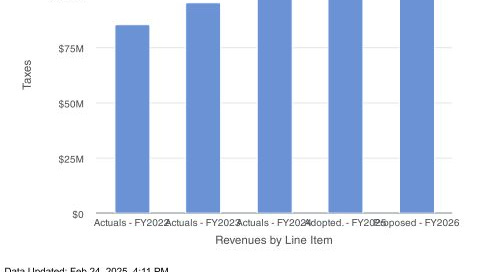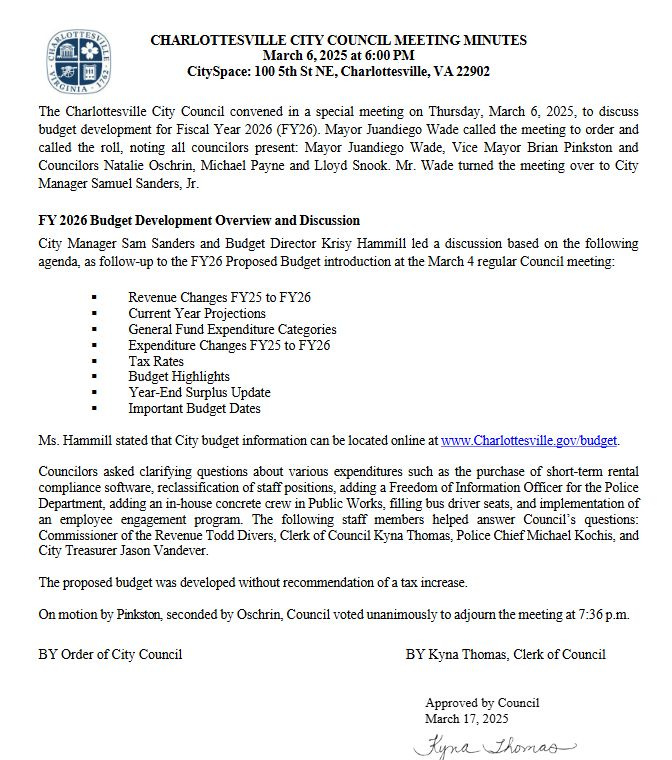April 10, 2025: Charlottesville City Council to hold a wrap-up budget work session tonight
But what are they wrapping up, exactly?
Today’s edition is a little different because this is sort of something that would make sense on Charlottesville Community Engagement. Tonight at 6 p.m. the Charlottesville City Council will have a wrap-up session on the development of the fiscal year 2026. (learn more about the meeting)
I’m approaching 20 years of writing about the finances in this community. Five years ago I decided to go independent and to use the Substack platform as one way people can pay me if they would like me to continue using my time and labor to be as up to date as possible. That is the service I offer, a service I believe is worth their civic investment.
This particular newsletter is still in the imaginary phase where I am still trying to figure out if I could make this a viable business. The goal of Fifth District Community Engagement is to help create a sense of political culture in a Congressional district that for the first time in my life makes sense geographically.
I would like people in different parts of the district to have a better sense of what’s happening elsewhere. In my imagination, I can imagine this developing the same way Charlottesville Community Engagement has developed. I’d love there to be some sort of a companion website as there is for Information Charlottesville.
This edition is different because I’m going to explain a bit more about how we got from the recent past to today when the City Council will have a wrap-up session this evening. I will also be digging into my own history about the budget to provide perspective. Why? As I’m fond of saying, it’s all an experiment!
Covering Charlottesville government up close since 2007
I’m not entirely sure when I wrote my first story about Charlottesville’s budget. Twenty years ago around this time I was in the early days of launching something called the Charlottesville Podcasting Network. The idea was to experiment with putting out audio stories. However, the site never quite materialized because I didn’t really have the experience yet.
Eighteen years ago, I was hired to work as the first employee of Charlottesville Tomorrow, a blog that had ambitions to become a source of original reporting about municipal government. I started just after the adoption of the FY2008 budget.
“I am proud to present the City Council Adopted Fiscal Year 2007-2008 City Budget, a total operating budget of $122,154,764, an 11.34 percent increase over the current year’s Budget,” reads the introduction to the FY200 budget from Gary O’Connell. O’Connell served as City Manager from 1995 to 2010 before taking a job as executive director of the Albemarle County Service Authority.
This budget was the first to be tied to a strategic plan and at the time the city slogan was “A World Class City.” The FY2008 budget was also the beginning of the Charlottesville Affordable Housing Plan with an initial $1.75 million investment.
I did not cover development of this budget and it would be a few years before I really understood how budgets work. I’m still not entirely sure, but I’ve spent a lot of time going through documents and letting people know what is in them.
I would end up leaving Charlottesville Tomorrow in the spring of 2018, a move I made reluctantly but knew I needed to make room for a new vision for that organization once the first director left. What I didn’t expect was how strange it was to not write about the development of the budgets in Albemarle and Charlottesville in 2019 and the early part of 2020.
Or rather, to not have a public place to write. I thought my new job would involve writing, but it mostly involved shouting at people or encouraging people to shout. Not my style, so I looked for a way out from the beginning and set up a website. One of the practice stories I posted was a review of the initial look at the capital budget for FY2019.
“The Charlottesville Planning Commission on Tuesday will see a draft capital improvement plan for the next five years that corresponds with a desire by City Council to refurbish the existing stock of subsidized housing units,” reads the lede paragraph from an article I posted in December 2018 to a blog I did not publicize.
At the time, Deputy City Manager Mike Murphy was serving as interim city manager as Gary O’Connell’s replacement, Maurice Jones, did not have his contract renewed by Council.
Let’s flash forward to the beginning of the pandemic. I was still at the advocacy organization and increasingly unhappy at working a job where I had to tell people what to think. All I wanted to do and all I want to do now is tell people what is happening. I created a podcast to satisfy what I can only describe as a calling. The Charlottesville Quarantine Report did not have much of an audience, but it documented as much as it could.
By the fall of 2020, I had quit the advocacy job and was on my way to devoting my life and time to this work. By the fall of 2020, interim City Manager Mike Murphy was gone, as was his replacement, Tarron Richardson. City Attorney John Blair was serving as the interim city manager and I was back at work.
“As you all know there are a number of large scale capital projects that have been talked about in various iterations through the past few years but what I’ve asked our budget team is to provide you with some numbers that are going to demonstrate using your debt capacity for various projects,” Blair said to the Charlottesville Planning Commission in November 2020.
It is now time to introduce the concept of the land book. Virginia code establishes that each locality must have a book that states the assessed value of each parcel of property. The final page lists the total number of parcels, the total taxable assessed value of land, the total taxable assessment of improvements, the total taxable value, and the amount of real estate tax the city can expect to collect.
The earliest land book available online is for 2015 and the total tax available to the city was $54,190,068.15. That increased to $77,777,737.85 in 2020.
In January, City Council was told that there was a current shortfall for the fiscal year. At the same time, Council was seeking ways to finally move forward with a long-awaited renovation of Buford Middle School. By March, Chip Boyles had been hired to serve as City Manager. He would be gone by the end of the year and replaced with a company hired to provide an interim manager.
All of these details are reported on Information Charlottesville. Now, let’s step forward.
Prepping the FY26 budget
Sam Sanders has been city manager since August 1, 2023 having been hired as a deputy city manager by Boyles. Since taking on the top position, Sanders has attempted to manage in a transparent manner. That has included efforts to engage with his City Council as often as possible.
The development of the budget that will begin on July 1, 2025 officially kicked off at a work session on September 16, 2024.
“The FY26 budget will build off a FY25 total budget of $251,948,630 that is a 10.29 percent increase over the FY24 budget,” I wrote in my story from the work session.
That amount is more than double what the budget was back in 2008. The cost to buy housing continues to go up. That’s reflected in higher assessments. The published land book for 2024 shows that the city would collect $104,649,939.84 in total taxes based on a real property rate of $0.96 per $100.
However, Sanders proposed a two cent increase and Council agreed, so the actual collectable amount in 2024 increased to $106,830,146.92. The land book for 2025 has not been posted but assessments are up an average of 7.74 percent.
Sanders held several work sessions with Council between September and early March when he released a budget for FY2026 that is not based on a tax increase.
The recommended budget as introduced totals $264,474,183 and is a 4.97 percent increase over the current year.
“That’s $12.5 million in additional money,” Sanders said.
So far this spring I have made an editorial choice to focus on Albemarle County. You can read those stories here. Next in this newsletter, some resources to get me and you up to speed on tonight’s wrap-up work session. This is not a complete report and this is not ideal. Ideal would be to have a story out each day, the way I used to do at Charlottesville Tomorrow when we had a partnership with the Daily Progress.
Still. Let’s go.
The FY26 Budget Development Process so far, told in quick bulleted points
Council has held budget work sessions on March 6, March 13, March 20, and March 27. I won’t be able to fully summarize them all here, but we’ll go one by one.
March 6, 2025: Work Session #1
The March 6, 2025 work session lasted an hour and a half.
Some other things that jump out at me that aren’t in the minutes:
Charlottesville Area Transit is adding eight drivers and a mechanic.
The city is using $900,000 in general fund revenue to pay the Charlottesville Parking Center for the lease for the Water Street Parking Garage. Learn more about that here.
City Councilor Michael Payne said a top priority for him is building a permanent homeless shelter
March 13, 2025: Work Session #2
The March 13, 2025 work session lasted just over two hours.
Some things that jumped out at me:
Several items that had been funded out of the Vibrant Community Fund have been changed to be funded through the City Manager’s Discretionary Fund. These include $5,000 for the “WTJU Radio - Black Business Expo”, $5,000 for the UVA Film Festival, $5,000 for the Virginia Festival of the Book, and $2,500 for the Charlottesville Opera.
Several organizations funded in the past through the competitive Housing Operation and Programs Support were lower than in previous years and at lower amounts than requested.
Sanders explained that a $298,000 request from the Charlottesville Redevelopment and Housing Authority for Community Development Block Grant funds to replace roofs at the Dogwood portfolio was ineligible. He said the city co-owns those houses and that request should have been made through a different channel and made as part of a report to Council. Council agreed to pay for half of the $10 million purchase price in the spring of 2023.
Through March 13, the city had disbursed $501,977 through the emergency Pathways Fund to 692 individuals. The average disbursement is $725.40 and 70 percent of requests are housing related.
Sanders took some time to describe the $967,000 in requests that have come from non-profits outside of the budget cycle. These range from $175,000 from the Uhuru Foundation to expand their re-entry services to a request for funds $500,000 from the Dogwood Veterans Memorial for a pedestrian bridge. Sanders said he is hoping to have final decisions at today’s budget wrap-up session.
Technical errors led the Blue Ridge Coalition for the Homeless to lose a $250,000 federal grant. Executive Director Shayla Washington explained this was due to accounts not being transferred to her account with the U.S. Department of Housing and Urban Development.
Various other groups appealed for additional funding from Council.
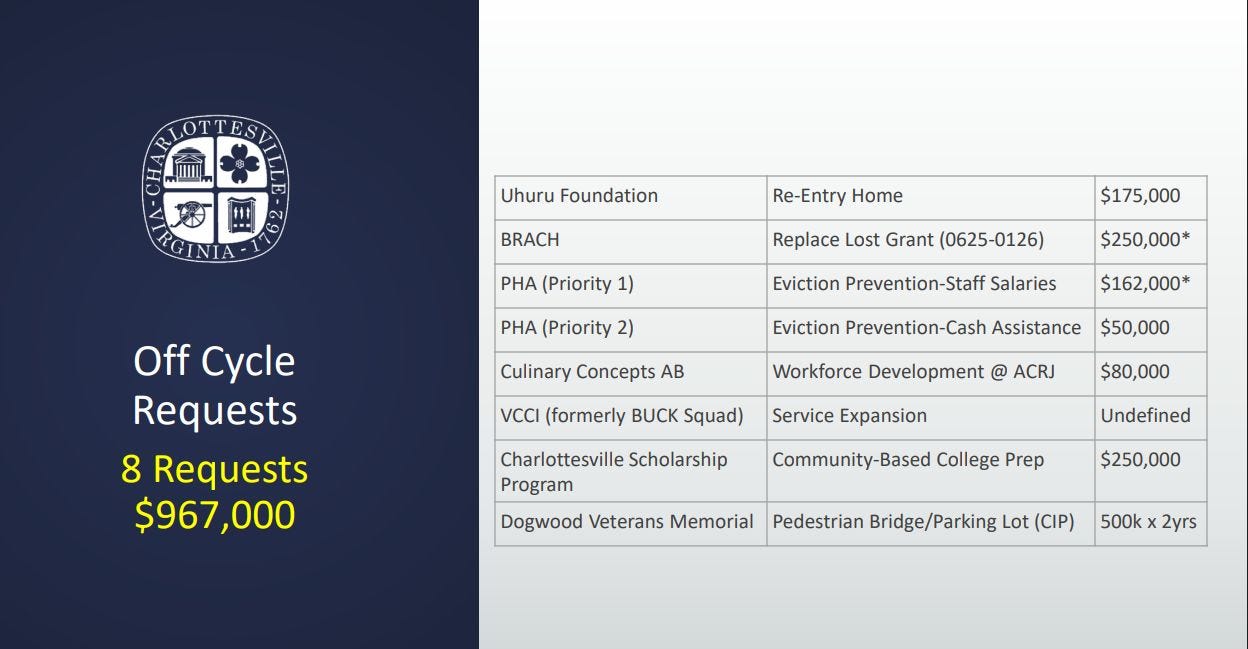
March 20, 2025: Community Budget Work Session
This event lasted just over two hours.
The minutes are not yet posted here but they are posted here.
After a series of speakers, Sanders queued up a discussion of discretionary spending opportunities for Council.
“We are managing competitive processes, using community based review teams and committees to make recommendations to you,” Sanders said. “But we also recognize that you would like to participate in that.”
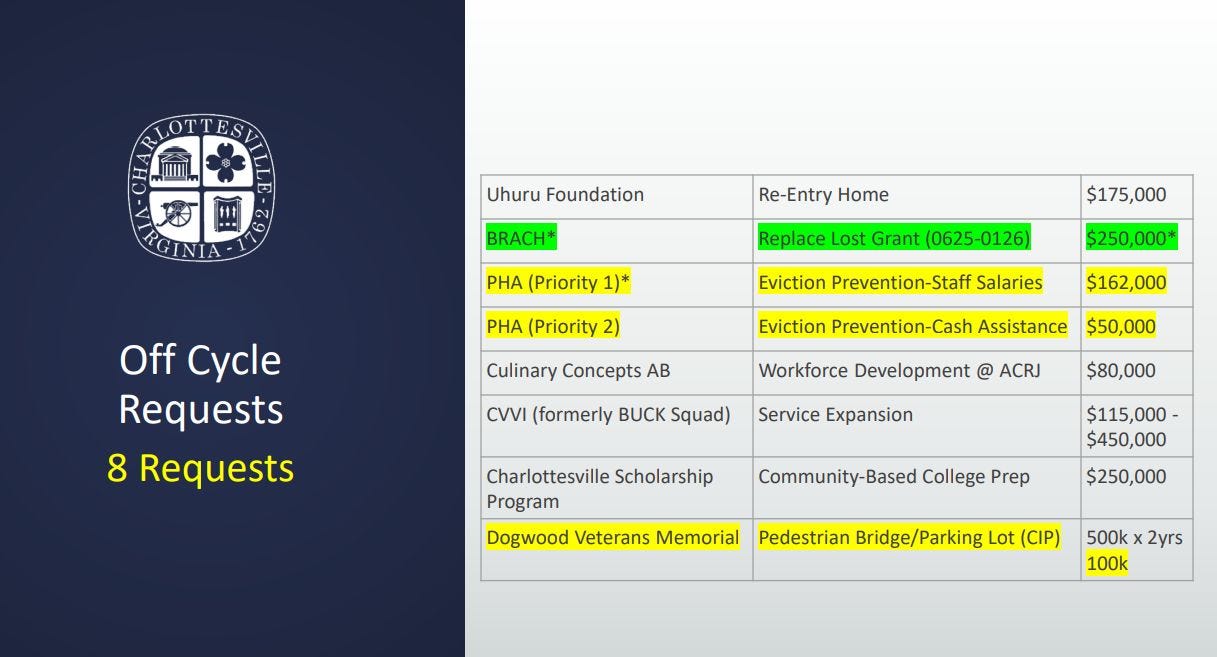
Some highlights:
Deputy City Manager Ashley Marshall explained more about the $250,000 to replace lost funding from HUD for the Blue Ridge Coalition for the Homeless would ensure continuity of service for a six month period.
There was discussion about the Dogwood Memorial Vietnam Memorial and their request for $1 million to pay for the pedestrian bridge. Council supported allocating City Councilor Brian Pinkston’s idea to put $100,000 toward the project.
There was much discussion about funding for individual groups and Council agreed to not fund a $4,200 request for Fralin Museum of Art at the University of Virginia. City Councilor Michael Payne said it was inappropriate for UVA to submit such requests for funding. City Councilor Brian Pinkston said removing the request was petty, but there were three votes to proceed just like last year.
Even though this was not the capital improvement work session, there was a discussion about debt service. The city will have $191,243,827 in outstanding debt as of June 30, 2025. The debt service payment for the current fiscal year is $17.9 million. That’s 7.1 percent of the total budget. The city plans on issuing $138 million in debt over the next five years.
Sanders warned that federal funds to support Charlottesville Area Transit are dwindling and it may time to consider adding fares back to the equation to recover some costs.
March 27, 2025: Work session on the Capital Improvement Program
This session lasted about two and a half hours
Some highlights:
The recommended budget anticipated a capital budget for FY2026 of $31,987,686. That comes from a transfer of $8.3 million from the general fund transfer, the issuance of $23.46 million in bonds, $200,000 from the schools, and $40,000 in miscellaneous revenue.
One project discussed at this meeting is $250,000 for access management for Riverview Park. There was $250,000 set aside in the FY26 budget for this purpose. Parks Director Riaan Anthony said the funding would be used for a study for ways to improve access to the park. For instance, some vehicles may be coming into the park with kayaks and other portable boats and one improvement might be to add space for this. He said the idea is not to increase parking spots. City Councilor Natalie Oschrin argued against any expansion of asphalt and she suggested people could park on neighborhood streets rather than the park. Anthony said the scope would likely cover the city’s new parkland to the northwest at 0 East High Street. City Councilor Michael Payne was also skeptical of this expenditure. There were three votes to proceed.
City Councilor Brian Pinkston continued to make a plea for funding for the Dogwood Vietnam Memorial. Councilor Natalie Oschrin expressed her concern about the project and said access might be improved without spending millions. Councilor Lloyd Snook said he could support $100,000 to help support a public-private partnership to build the infrastructure. Oschrin said there are other priorities that are more important to bring sidewalks compliant with the Americans with Disability Act.
Charlottesville City Schools requested moving up the design and construction of an early childhood education center at the Walker School by one year. Council agreed. This will mean selling bonds a year in advance.
Council moved off of the capital budget and into operations by moving into a discussion of increased funding for Charlottesville Area Transit. Deputy City Manager James Freas said the city will continue to offer service fare free, and the costs have increased as part of the collective bargaining agreement now in place. This is a robust conversation that deserves its own post, but I have to move on.
I did not finish a review of this work session, so this is an incomplete account of that work session. In a perfect world I would be able to cover these more quickly. We live in a world where legacy media outlets decided it is not worth investing in keeping a close eye on everything.
I believe it is crucial to the future of this country for more people to understand the complexities involved. My role is keep doing this, knowing full well there are so many people who would like it if there was no robust coverage of the decision-making process.
Not on my watch.
I am grateful for everyone who has helped pay my way over the years, including those who donated to Charlottesville Tomorrow as I learned to do this work. I’m going to keep going until I can’t do this anymore. When will that be? I cannot know that.
Now, one final story reprinted from yesterday’s Charlottesville Community Engagement.
Charlottesville on track to adopt budget on April 14
In Virginia, localities are subordinate to the state government. Virginia code lays out specific requirements for what cities and counties must do with regard to how public money is spent.
For instance, §58.1-3321 sets out rules for if a locality’s property reassessment results in more money coming in than the previous year. For details quickly, here’s a story I’ve previously written about how localities must provide a public notice for something called the “lowered tax rate.”
Charlottesville City Council was originally scheduled to hold a public hearing on the tax rates for the current fiscal year on March 17. However, the Charlottesville Daily Progress placed the public notice in a section of their newspaper that did not comply with state code.
A second advertisement was made for an April 7 meeting on the property tax rates. However, Charlottesville Resident Jim Moore filed for an injunction on April 4 arguing that this notice was not publicly posted in a prominent location inside City Hall.
While the city responded in Charlottesville Circuit Court seeking denial of the injunction, a decision was made to postpone the property tax rate public hearing until April 21. However, the second public hearing for the budget itself was still held this past Monday.
Before that, Moore took the opportunity during the public comment period to address Council to express confusion.
“Your agenda says this is about a real property tax rate,” Moore said. “Your Daily Progress notice says this hearing would have been about a real property tax increase. Your proposed budget says that the budget does not require a tax increase.”
City Councilor Michael Payne asked for a clarification.
“The budget does not include tax increases?” Payne asked.
“There is no change to the tax rate but there is a change to the reassessments,” said City Manager Sam Sanders.
The real estate tax rate proposed for 2025 is the same as 2024 at $0.98 per $100 of assessed value. This gets confusing because the tax rate applies to the calendar year, not the fiscal year.
Here’s what the budget says on page 65.
“The FY26 projection for this revenue is roughly $117 million, which represents an increase of $8.6 million, or eight percent, over the adopted FY2025 budget,” reads the budget.
The increase is due to an overall reassessment increase of 7.74 percent for 2025, as reported in January.
When the next public notice in the Charlottesville Daily Progress is printed to advertise the 2025 tax rates, state code requires it to list these four items:
“Total assessed value of real property, excluding additional assessments due to new construction of improvements to property, exceeds last year’s total assessed value of real property by 7.36 percent.”
“The tax rate which would levy the same amount of real estate tax as last year, when multiplied by the new total assessed value of real estate with the exclusions mentioned above, would be $0.9128 per $100 of assessed value. This rate will be known as the ‘lowered tax rate.’”
“The City of Charlottesville proposes to adopt a real estate tax rate of $0.98 per $100 of assessed value. The difference between the lowered tax rate and the proposed rate would be $0.0672 per $100 or 7.359 percent. This difference will be known as the “effective tax rate increase.”
“Based on the proposed real property tax rate and changes in other revenues, the total budget of the City of Charlottesville will exceed last year’s by 4.97 percent.”
Virginia code does not require the above information to be posted in the budget document itself. Council was also not given these specifics on Monday night.
For another example of what other communities do, look at a release sent out this afternoon by the City of Lynchburg that follows the same format.
The first public hearing on the budget was held on March 20 as part of the Community Budget Forum. A second public hearing was held Monday as introduced by budget director Krisy Hammill.
“We've also talked about some amendments and changes along the way through our work sessions,” Hammill said. “We'll have a work session this Thursday night to work on finalizing some of those.”
Sanders said Council will still move forward with the budget process and the hearing on the tax rate can take place after adoption.
“We're still moving forward through the budget process and we are making sure that we adhere to our obligation to provide proper public notice for the public hearing related to the tax levy,” Sanders said. “So that is what we're resetting. We're resetting the order in which that happens.”
In Virginia, a separate public hearing must be held for the budget and the tax rates. The second public hearing proceeded and the only speaker was Jim Moore who said many in the city are becoming cost burdened by increasing tax bills.
“Your notice that you put in the ad specifically says there will be an effective tax rate increase of 7.359 percent,” Moore said.
He said one property he owns now has a real estate tax bill for 2025 that is $1,104 higher than in 2021.
“I encourage you to consider whether your tax trajectories are sustainable without unduly straining residents,” Moore said.
The second public hearing on the budget also served as the first of two readings to adopt the budget. The second reading will be on April 14. There will also need to be two readings of the tax rates.
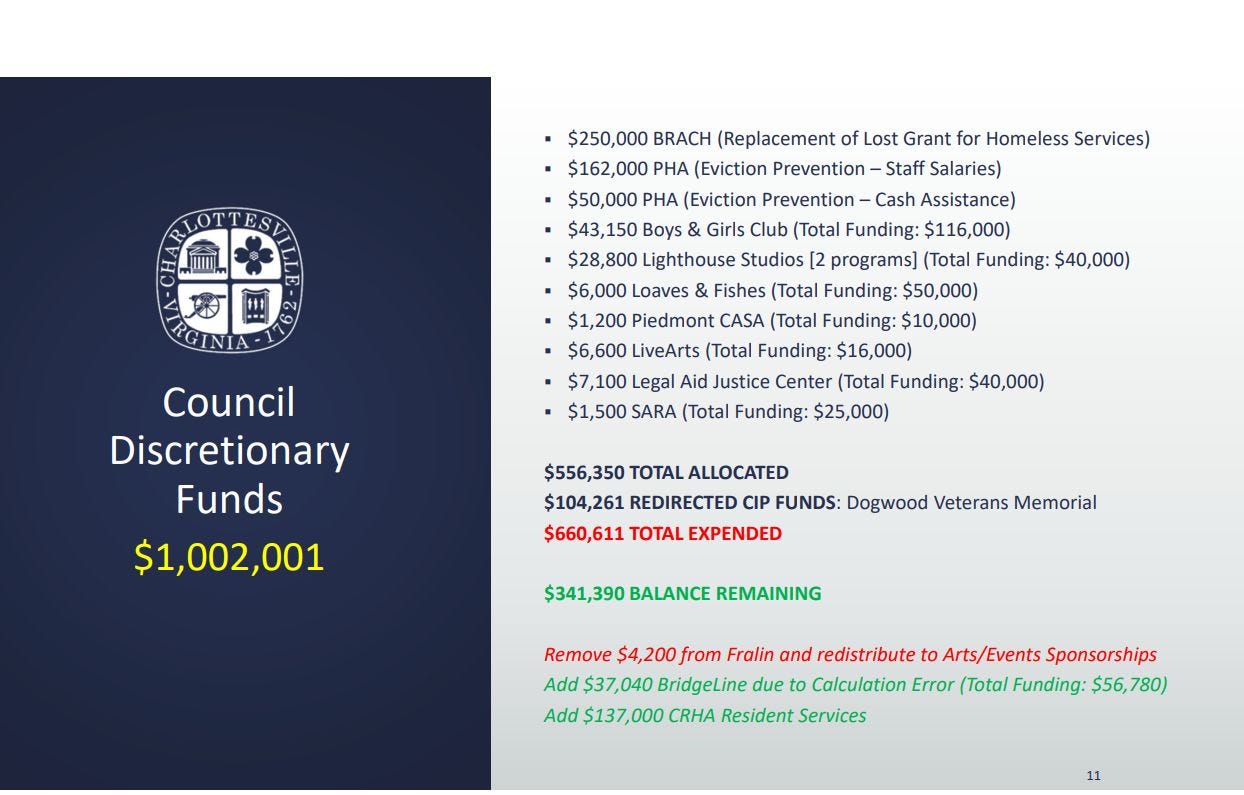
Reading material:
Scottsville seeking person to fill spot on planning commission, CBS19 News, April 9, 2025
‘Political stunt after political stunt’: Tensions flare as Goochland Schools appoints new superintendent after sudden firing, Victoria Lewis, WRIC, April 8, 2025
From disc golf to clean laundry, FLDP projects strengthen Fluvanna, Heather Michon, April 10, 2025
Pollitt: From Tappahannock Town Manager to Amelia County Administrator, Michelle Smith, News on the Neck, April 10, 2025
